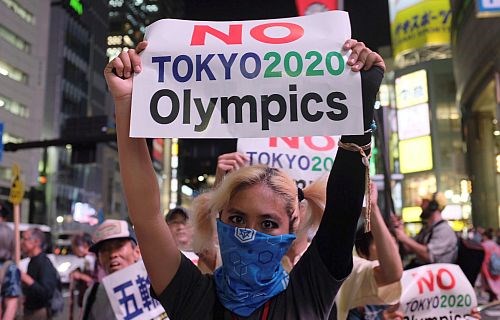Mega-events and human rights: Duel or dialogue?

Protester taking the streets in Tokyo as part of a international gathering of activists protesting against the 2020 Tokyo Olympics. Photo: Kwiyeon Ha/Reuters/Ritzau Scanpix
01.10.2019
By Play the GameIn the last decade, there has been a growing number of protests over the hosting of major sporting events. One issue has been the costs and overall lack of sustainability of mega-events. Another has been human rights problems in the countries hosting the spectacles.
Last year, the host of the 2018 World Cup – Russia – was criticised for the citizens’ lack of freedom of speech, imprisonment of political opponents of the state and especially the lack of rights for LGBT persons. The Olympics next year in the Japanese capital of Tokyo have also been subject to protests organised by the anti-Olympics movement NOlympics. The protest were part of a first international gathering of activists from several countries with the message that the Olympics should be banned across the world as it contributes to poverty and harms the environment.
Despite this tendency, some countries with poor human rights records – like Qatar, Russia, Azerbaijan and China – still invest a lot of money in elite sport and mega-events hoping to create a more positive image worldwide – the so-called ‘sport-washing’, designed to divert attention from the more concerning human rights issues in some of the host nations.
Focus on human rights issues
At Play the Game 2019 different actors from both inside and outside of sport will share their perspectives on the growing attention on the relationship between mega-events and human rights.
The Vice President of the European Olympic Committee (EOC), Niels Nygaard, will give his view on the EOC’s newcomer – The European Games – which has been criticised for placing its first two events in Azerbaijan and Belarus, which are among the European countries with the poorest human rights records. Gigi Alford, Director of Sport and Human Rights at the World Players Association, and Mary Harvey, CEO at the Centre for Sport and Human Rights, will be sharing their views and thoughts in regards to the pressure from NGOs outside of sport on the big sports organisations, while professor of economics Andrew Zimbalist will shed some light on the economics behind mega-events and the problems concerning the displacement of citizens to make room for sporting facilities.
The NOlympics movement has received a lot of attention lately, not least because of their gathering in the streets of Tokyo to protest against the 2020 Tokyo Olympics. Co-founder Jonny Colemann from the organisation’s Los Angeles branch will present the organisation’s intentions and main goal for the demonstrations. Last, but not least, FIFA’s Head of sustainability & diversity Federico Addiechi will account for the advances FIFA has made in his area of responsibility.
What will be the legacy of a big sporting event?
At Play the Game 2019 we will also take an academic approach to the debate on the legacies of sporting events. Professor Harry Arne Solberg from Trondheim Business School in Norway will talk about the economic challenges of hosting major sporting events, while professor Tim Lawrence Walters from Okanagan College in Canada will elaborate on the 2022 World Cup in Qatar and why he believes that football has the potential to become a mechanism to reduce inequality and enhance social justice.
The mega-event sessions will also touch upon questions like human rights and the IOC’s ‘Agenda 2020’ and how it has impacted the human rights issues, cost overruns, empty facilities, and (the lack of) public involvement.
Different aspects of hosting mega-events will be up for debate at Play the Game 2019.
You can see the full programme, the list of speakers and all other information you need about the conference at the conference website.
Play the Game 2019 would not be possible without the generous support from the University of Colorado, Colorado Springs, and a great number of sponsors in Colorado Springs and Denmark. You can see the list of sponsors here.






